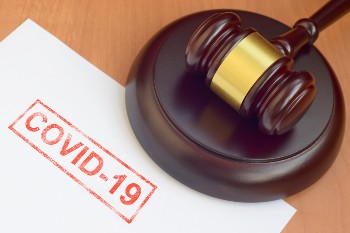The recent pandemic, COVID-19, can and will affect personal injury lawsuits – especially when it comes to how quickly they can be resolved. These impacts will greatly depend on where you live in the United States. And if you live in one of the more affected areas, you may experience further delays than those in states with fewer occurrences.
In the state of Washington, where it was named one of the first hotspots for the outbreak, personal injury cases are going to see significant delays. COVID-19 has already closed down numerous businesses, and state-wide lockdowns have pushed back trial dates – especially for civil cases. While there may be delays in the courtroom, this is not a time for panic.
Most attorneys and insurance companies know that the case doesn’t stop just because civil courtrooms are closed. Instead, private negotiations will still continue on, and you may still resolve your case amidst the COVID-19 pandemic.
Tips to Help You Protect Your Personal Injury Case during COVID-19
If you have already filed a lawsuit, then you should speak with your attorney to see what is going on, what you can do in the interim, and how the virus may impact your case.
If you plan to file a lawsuit, you need to act and protect your case as much as you can while you wait to meet with an attorney.
Continue with Medical Care – If You Can
The most important thing to do is maintain your medical care. Most physicians are remaining open, especially for patients that require care and treatment.
While you have already received emergency care, you may be receiving physical therapy or seeing a family care physician for the remaining part of your treatment.
Do not stop this. If your physician has closed, see if they are continuing follow-up appointments and monitoring using telehealth services. If your physical therapist or another specialist has shut down, ask for a referral from your family physician and save any notices of an official shutdown to give to your attorney.
Bottom line, maintain your medical care (if you can) and document your attempts to get that care if offices are closed. The more proactive you are, the easier it will be to fight back against any insurer trying to say your injuries are not real. If you are afraid to see your doctor, which is understandable in this situation, you need to do what you can to maintain your treatment. That means going to your appointments (if they are not cancelled by the provider), wearing a mask, sitting at least six feet apart from others in the waiting room, washing your hands, and not touching your face.
Without medical treatment, your attorney cannot prove that your injuries are that severe. Medical records are paramount in an injury case, and you cannot settle until your treatment is almost complete. Furthermore, if you are the cause of delays in medical treatment – and not your provider – you may lose compensation.
If You’re Quarantined, Stay Home
If you have been officially quarantined due to exposure to a positive patient, and the state health department has told you that you are under a mandatory quarantine, then stay home. Mandatory quarantines are not the same as stay-in-place orders.
Stay-in-place orders allow you to still seek medical care and see your physician for treatment, while mandatory quarantines mean that you cannot leave your home for the 14-day quarantine period.
Do Not Give Insurance Companies a Statement
Unfortunately, some insurance companies may try to contact you during this time, asking for a statement or wanting to negotiate a settlement. You are not required to provide a statement, and it is in your best interest to wait until you speak with an attorney before doing so. While the insurance company might offer a settlement to you, you need an attorney by your side to make sure you’re receiving a fair amount.
You are already injured, you might have even lost your job during the shutdown, and an insurance company knows you are stressed and in dire need of income. Just realize that the amount they are offering you is not usually what you deserve – or even the highest they will go.
Find a Law Firm Open during the Outbreak
A lot of law firms have shut down, but there are even more that still plan to operate during this outbreak. These law firms might be working from home, but that doesn’t mean they cannot help you with your injury case.
Not all law firms will have the infrastructure to remain open or operate during the outbreak, but there are others who work diligently from home and still serve their clients – working hard to settle cases despite what is going on. These law firms still operate as a team, meet together, and continue to work on their clients’ settlements. They will still contact insurance companies because, while a lot of companies have shut down, insurance is not one of them.
Injured? Contact a Local Law Firm Ready to Fight for Your Right to Compensation
Yes, cases will be impacted by COVID-19, but how much they are impacted depends on the steps you take and the law firm you are working with. Most firms continue to work on client cases. So if you have been injured during this crisis, do not think you don’t have options for representation.
The attorneys at Brett McCandlis Brown & Conner, PLLC, are here to help. We want to serve as your advocate during these unsure times, and most importantly, we want to make sure that your case doesn’t experience unnecessary delays for something out of your control. To get started, schedule a consultation with our team. Depending on the current situation, we may be able to meet over the phone until this outbreak is over, or we may be able to meet in person if the stay-in-place order has been lifted.
You can also reach out to a team member online by completing our online contact form.


